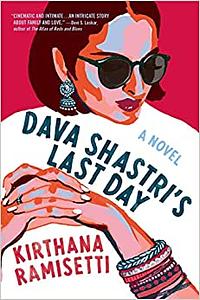Take a photo of a barcode or cover
Interesting concept, but not terribly intriguing. I felt like this was wrote in the style of Taylor Jenkin Reid's "The Seven Husbands of Evelyn Hugo" but was much less successful in character development and making me want to care about the characters. Seeing as this takes place in the future, I thought more effort could be put to how the world would have changed by that time in terms of climate change, post pandemic, technology, healthcare, etc.
Essa Dava inventa cada coisa
Drama familiar muito gostosinho, consegui me conectar com todos os personagens e entender perfeitamente o ressentimento deles com a pira do legado Shastri. Dava foi uma mulher extremamente ambiciosa e até pra morrer teve massagear o ego antes disso, sem se dar conta do quão egoísta foi ao envolver os filhos nisso. Mas quem sou eu pra julgar né? (já julgando).
No fim eu gostei da personagem e da sua história de vida, terminei o livro sentindo que Dava Shastri realmente existiu.
Drama familiar muito gostosinho, consegui me conectar com todos os personagens e entender perfeitamente o ressentimento deles com a pira do legado Shastri. Dava foi uma mulher extremamente ambiciosa e até pra morrer teve massagear o ego antes disso, sem se dar conta do quão egoísta foi ao envolver os filhos nisso. Mas quem sou eu pra julgar né? (já julgando).
No fim eu gostei da personagem e da sua história de vida, terminei o livro sentindo que Dava Shastri realmente existiu.
Not bad, just not quite what I was expecting.
From the description, blurbs, and first few pages, I thought I was in for a dark comedy with lots of family hijinks. The story is much more serious than that. It explores some really interesting questions: How do you want to be remembered when you're gone? What do you leave behind in the world? What actually matters when you're in your final days? However, once I was past the halfway mark I felt my attention wandering and I was ready to just get to the end. Not a bad read, but not something I'll go out of my way to recommend to friends.
From the description, blurbs, and first few pages, I thought I was in for a dark comedy with lots of family hijinks. The story is much more serious than that. It explores some really interesting questions: How do you want to be remembered when you're gone? What do you leave behind in the world? What actually matters when you're in your final days? However, once I was past the halfway mark I felt my attention wandering and I was ready to just get to the end. Not a bad read, but not something I'll go out of my way to recommend to friends.
3.5 stars. I was so excited about the premise of the book and couldn’t wait to get started. I found the thrown-in anecdotes from the past confusing at times and also didn’t understand why the book was set in 2044. For being two decades in the future, there weren’t any indications of life being any different at that point than now…it seems random. But I do like the storyline of a female kick-ass legacy.
I really enjoyed this book if not the characters themselves. The premise alone made it worth a read. And the secrets themselves are not earth-shattering, the slow meandering way upon which they reveal themselves was pretty riveting for me.
The nostalgia of the culture and music really drew me in even if I didn't root for any of the characters. Despite everything though, I still found myself admiring Dava even beyond the end.
The nostalgia of the culture and music really drew me in even if I didn't root for any of the characters. Despite everything though, I still found myself admiring Dava even beyond the end.
A very powerful story about a flawed yet lovable family.
emotional
mysterious
reflective
sad
medium-paced
Plot or Character Driven:
Character
Strong character development:
Complicated
Loveable characters:
Complicated
Diverse cast of characters:
Yes
Flaws of characters a main focus:
Yes
Graphic: Alcoholism, Cancer, Infidelity, Terminal illness, Grief, Death of parent, Alcohol
Moderate: Domestic abuse, Emotional abuse, Toxic relationship, Xenophobia, Medical content, Pregnancy
Minor: Vomit
medium-paced
Plot or Character Driven:
Character
Loveable characters:
No
Diverse cast of characters:
Yes
Flaws of characters a main focus:
N/A
The only reason this didn’t get 5 stars was some of the cheesiness, repetitiveness, and cliched writing. But the rich story, the depth of the characters, and the beauty with which Ramisetti writes about death are incredible. Sometimes the flashbacks got a little confusing, and I almost wish we had gotten more time in the present with the siblings. I loved all of the music references and the South Asian content, although they did misspell Telugu :( Overall, though, this book was an honest, complicated, beautiful endeavor to try to encapsulate the struggles of life, death, and dying.
I very much enjoyed Dava Shastri's Last Day, this month's book club pick. I am very glad that this book was suggested; it was not one that was on my radar. (It is a GMA book club pick, though.) Dava Shastri is a successful business person and a philanthropist. She is also 70-ish widow and mother of four adult children with a terminal illness. As her family gathers on her island around the Christmas holiday, Dava shares the fact of her illness and what she plans to do about it.
Her children, Arvie, Sita, Kali, and Rev (two males and two females) each have their own unique issues and throughout the book we learn about Dava and her children, past and present. They all have secrets and flaws, yet I did not hate any of them. There is a lot going on and many different perspectives, and I thought the author kept it all together and interesting. Although I did not know all the songs and musical artists referenced (not even sure if they are all real), I enjoyed how music played a part of the story.
"To Dava, hugging Tom Buck after being married to Arvid was akin to visiting Chicago after years of living in New York City. It was not as great as her hometown but enjoyable for being a different kind of big-city experience. She would never leave New York but did not mind going to Chicago now and then." (153)
"Dava had no idea why her eldest son was so intent in his need to fade into the world, rather than risk anything to make his mark. But this quality in him was why she believed there had always been a coolness to their relationship, which had started in his teen years and fractured into a cordial estrangement once he moved to Stockholm after graduating from college." (283)
"When she had to go through the rituals of grief for each parent and then Arvid, each time was more heartrending than the one before. Whether death visited her suddenly or the visit was a long time coming, the grief also felt the same: heavy, suffocating, impermeable. She did not want that for her children or grandchildren. She did not want to be at the center of a living wake, having them crumple-faced and sobbing as she took her final breaths. She wanted joy." (315)
Her children, Arvie, Sita, Kali, and Rev (two males and two females) each have their own unique issues and throughout the book we learn about Dava and her children, past and present. They all have secrets and flaws, yet I did not hate any of them. There is a lot going on and many different perspectives, and I thought the author kept it all together and interesting. Although I did not know all the songs and musical artists referenced (not even sure if they are all real), I enjoyed how music played a part of the story.
"To Dava, hugging Tom Buck after being married to Arvid was akin to visiting Chicago after years of living in New York City. It was not as great as her hometown but enjoyable for being a different kind of big-city experience. She would never leave New York but did not mind going to Chicago now and then." (153)
"Dava had no idea why her eldest son was so intent in his need to fade into the world, rather than risk anything to make his mark. But this quality in him was why she believed there had always been a coolness to their relationship, which had started in his teen years and fractured into a cordial estrangement once he moved to Stockholm after graduating from college." (283)
"When she had to go through the rituals of grief for each parent and then Arvid, each time was more heartrending than the one before. Whether death visited her suddenly or the visit was a long time coming, the grief also felt the same: heavy, suffocating, impermeable. She did not want that for her children or grandchildren. She did not want to be at the center of a living wake, having them crumple-faced and sobbing as she took her final breaths. She wanted joy." (315)




